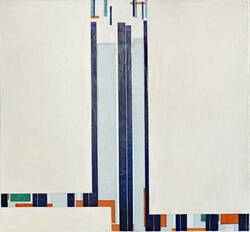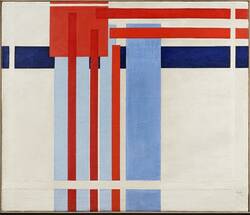Kupka, who was born in Bohemia, first stayed in Vienna for a short time before settling in France in 1895. He was an active combatant in the First World War and helped to establish the Czechoslovak Legion. He was a great draughtsman and one of the founders of abstract painting, which he developed mainly through the study of movement. His extraordinary relationship with music and poetry led to the emergence of a new artistic movement -
Orphism. In its radical departure from the representation of reality, František Kupka's work resembles that of the Dutch artist Piet Mondrian, who spent long periods in Paris between 1911 and 1938. Between 1931 and 1937 both men became members of the Abstraction-Création, an association of abstract artists, which was founded to counter the dominance of the figurative aesthetics of the Surrealist group around André Breton. Both painters consistently pursued their artistic experimentation. Although we do not know whether they were personally close, their mutual friend Theo van Doesburg may have been a point of connection.
As regards his work, and also in commercial terms, František Kupka is currently the most highly regarded artist with Czech roots. Yet he attracted almost no attention in the First Czechoslovak Republic (1918-1938), and even in the post-war period his abstract
compositions did not make any significant impact on Czech modern and contemporary art.
The most important patron of František Kupka in the Prague of the First Republic was the successful industrialist Jindřich Waldes. Many of Kupka's major works found their way into his collection, part of which today forms the basis of the important body of works by the artist at the National Gallery in Prague. The transfer of the art collection of Meda Mládková (1919-2022) from Washington to Prague, and the founding of the Kampa Museum there, which has presented Kupka as a prominent artist since 2003, were also important for his work gaining acceptance among the Czech public.
According to Petr Nikl, František Kupka “painted himself into cosmic fantasy.” For Jakub Nepraš and Lukáš Karbus, too, Kupka's works are also a major source of inspiration.
TRANSVERSE SURFACES II, 1923
ENSEMBLE STATIQUE, 1933
SERIES C, III – ELEVATION, 1935–1938
FRANTIŠEK KUPKA
b. 1871 in Opočno / Kingdom of Bohemia
† 1957 in Puteaux / France

